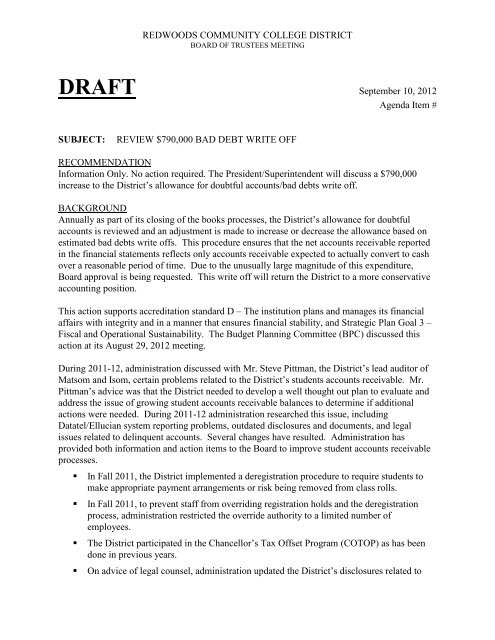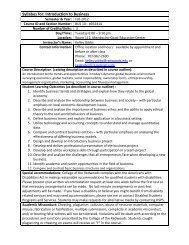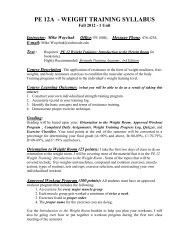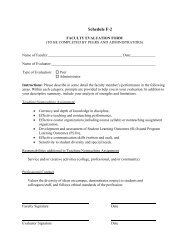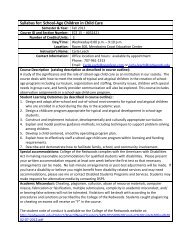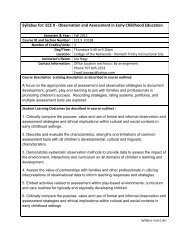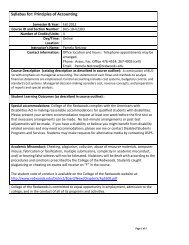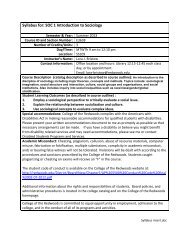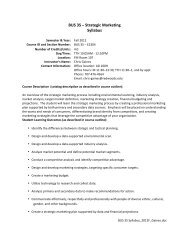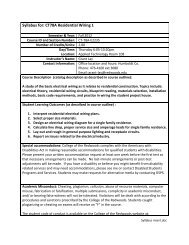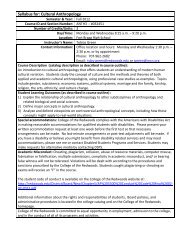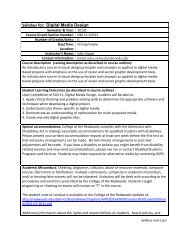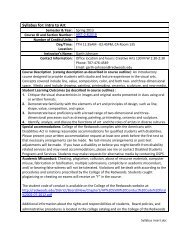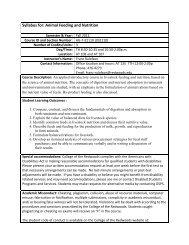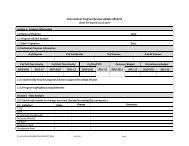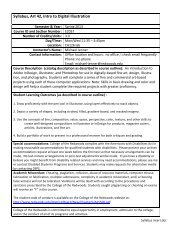Bad Debt Write Off
Bad Debt Write Off
Bad Debt Write Off
You also want an ePaper? Increase the reach of your titles
YUMPU automatically turns print PDFs into web optimized ePapers that Google loves.
REDWOODS COMMUNITY COLLEGE DISTRICT<br />
BOARD OF TRUSTEES MEETING<br />
DRAFT September 10, 2012<br />
Agenda Item #<br />
SUBJECT:<br />
REVIEW $790,000 BAD DEBT WRITE OFF<br />
RECOMMENDATION<br />
Information Only. No action required. The President/Superintendent will discuss a $790,000<br />
increase to the District’s allowance for doubtful accounts/bad debts write off.<br />
BACKGROUND<br />
Annually as part of its closing of the books processes, the District’s allowance for doubtful<br />
accounts is reviewed and an adjustment is made to increase or decrease the allowance based on<br />
estimated bad debts write offs. This procedure ensures that the net accounts receivable reported<br />
in the financial statements reflects only accounts receivable expected to actually convert to cash<br />
over a reasonable period of time. Due to the unusually large magnitude of this expenditure,<br />
Board approval is being requested. This write off will return the District to a more conservative<br />
accounting position.<br />
This action supports accreditation standard D – The institution plans and manages its financial<br />
affairs with integrity and in a manner that ensures financial stability, and Strategic Plan Goal 3 –<br />
Fiscal and Operational Sustainability. The Budget Planning Committee (BPC) discussed this<br />
action at its August 29, 2012 meeting.<br />
During 2011-12, administration discussed with Mr. Steve Pittman, the District’s lead auditor of<br />
Matsom and Isom, certain problems related to the District’s students accounts receivable. Mr.<br />
Pittman’s advice was that the District needed to develop a well thought out plan to evaluate and<br />
address the issue of growing student accounts receivable balances to determine if additional<br />
actions were needed. During 2011-12 administration researched this issue, including<br />
Datatel/Ellucian system reporting problems, outdated disclosures and documents, and legal<br />
issues related to delinquent accounts. Several changes have resulted. Administration has<br />
provided both information and action items to the Board to improve student accounts receivable<br />
processes.<br />
• In Fall 2011, the District implemented a deregistration procedure to require students to<br />
make appropriate payment arrangements or risk being removed from class rolls.<br />
• In Fall 2011, to prevent staff from overriding registration holds and the deregistration<br />
process, administration restricted the override authority to a limited number of<br />
employees.<br />
• The District participated in the Chancellor’s Tax <strong>Off</strong>set Program (COTOP) as has been<br />
done in previous years.<br />
• On advice of legal counsel, administration updated the District’s disclosures related to
delinquent accounts. New language has been added to the Catalog and other documents<br />
with this or a similar notation, Any account balances older than 120 days may be subject<br />
to the collections process. District account statements and collection letters have been<br />
revised. The District’s Account Collection Process disclosure which will be provided to<br />
delinquent account holders immediately prior to being turned over to collection, has been<br />
updated to note that delinquent amounts will be reported on credit bureaus and that<br />
collection costs will be added to account balances. With the Board’s approval, the District<br />
is preparing an RFP for account collection services.<br />
• The District explored options for handling collections on delinquent accounts. As noted<br />
in a July 10, 2012 Board information item, administration has changed the past practice<br />
of not charging student accounts for costs of collection and developed plans to minimize<br />
collection cost impact on 50% Law compliance.<br />
After reviewing the District’s student accounts receivable balances, an aging of accounts and<br />
evaluating the likelihood of collection, administration is now preparing a year-end closing entry<br />
to write down $790,000 and thereby adjust the net student accounts receivable to a conservative<br />
amount that can reasonably be expected to be collected.<br />
BUDGET IMPLICATIONS<br />
$790,000 will be recognized as an unrestricted general fund expenditure. A portion of this write<br />
down will likely be recorded as prior period adjustment, but these entries will reduce the ending<br />
fund balance below the 5.0% minimum requirement.<br />
LL/lw


